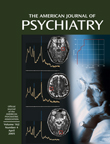Mind, Brain, and Personality Disorders
Abstract
OBJECTIVE: The use of the terms “mind” and “brain” in psychiatry is often associated with a set of polarities. Concepts such as environment, psychosocial, and psychotherapy are linked with “mind,” while genes, biology, and medication are often associated with “brain.” The author examines these dichotomies as they apply to personality disorders. METHOD: Research on antisocial and borderline personality disorders that is relevant to these dichotomies is evaluated. The implications of the findings for the understanding of pathogenesis and treatment are reconsidered. RESULTS: In the clinical setting, it is problematic to lump together terms such as “genes,” “brain,” and “biological” as though they are separate and distinct from terms such as “environment,” “mind,” and “psychosocial.” These dichotomies are problematic, because genes and environment are inextricably intertwined in the pathogenesis of personality disorders, psychosocial experiences may result in permanent changes in the brain, and psychotherapy may have its effect by altering brain structure and function. The “theory of mind” is a useful construct for bridging “mind” and “brain” in the treatment of personality disorders. CONCLUSIONS: Severe personality disorders are best understood and treated without “either-or” dichotomies of brain and mind. Each domain has a different language, however, and the language of the mind is necessary to help the patient develop a theory of mind.



